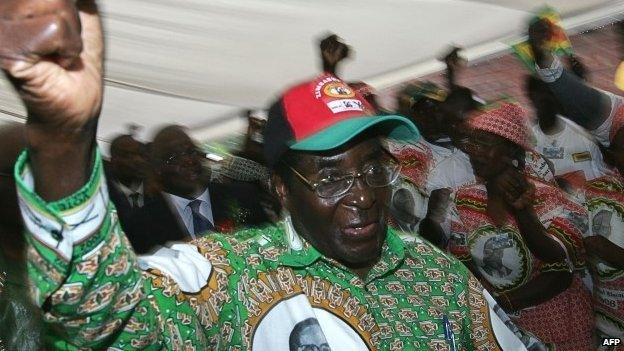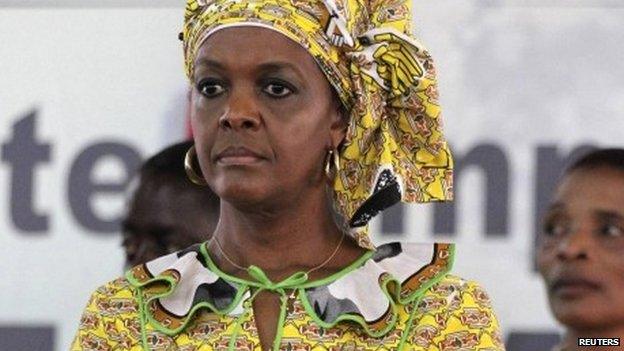Robert Mugabe admits Zimbabwe's land reform flaws
- Published

Robert Mugabe has ruled Zimbabwe since independence in 1980
Zimbabwe's President Robert Mugabe has admitted failures in the country's controversial land reform programme.
"I think the farms we gave to people are too large. They can't manage them," the 91-year-old leader said in unusually candid comments.
In the past he has tended to blame poor agricultural productivity on the weather and Western sanctions.
The seizure of land from white farmers is seen as a key factor in Zimbabwe's economic meltdown since 2000.
The BBC's Brian Hungwe in the capital, Harare, says it is not the first time President Mugabe has criticised new black farmers - but his comments are surprisingly frank.
They point to continuous problems in accounting for low production levels and the under-utilisation of farms, which reflect badly thought-out land policies, he says.

The president denied that Grace Mugabe was the "power behind my throne"
Mr Mugabe, who has ruled Zimbabwe since independence in 1980, was interviewed on the state broadcaster ZBC to mark his 91st birthday, which he celebrated last weekend.
He said he wanted to encourage farmers to go into wheat farming, and blamed low productivity on the new commercial farmers for failing to utilise all their land.
"You find that most of them are just using one third of the land," Zimbabwe's state-owned Herald newspaper, external quotes him as saying.
During the colonial era, the best farmland was reserved for the white population and in 2000, Mr Mugabe spearheaded the seizure of the land from some 4,000 white farmers.
His critics say the land was handed out to his political allies and many of the beneficiaries were not given the equipment or training to farm productively, leading to the collapse of the agriculture-based economy.
In the interview, he also denied pushing his wife Grace to enter politics.
Last year, she became head of the women's league and in the ruling Zanu-PF party, and embarked on a nationwide tour, in which she denounced party rivals.
This led to speculation that she was being readied to succeed her husband as president.
"She is not the power behind my throne. She has come into politics in her own right," Mr Mugabe said.
The headline of The Herald, widely seen as a government mouthpiece, is: "I'm still in charge, says President".